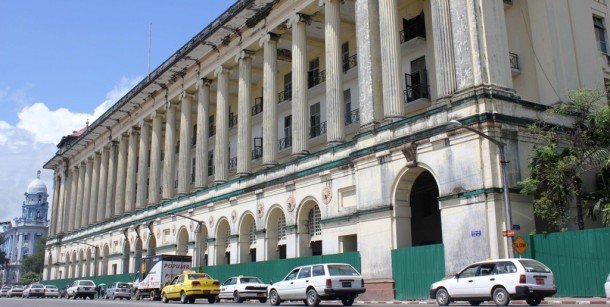NAYPYIDAW — Switzerland’s Kempinski Group, a Thai investor and a Burmese conglomerate have been allowed to turn Rangoon’s colonial-era, former Police Commissioner’s Office into an international luxury hotel, a senior official said on Monday.
The privatization plan is being fiercely opposed, however, by a group of Burmese lawyers who want to restore the landmark building to its function as the Rangoon Division Court.
Aung Naing Oo, secretary of the Myanmar Investment Commission, told The Irrawaddy that the commission had approved a plan to let Kempinski Group and its partners develop the historic building into an establishment for well-heeled visitors. “We’ve allowed the former [Police] Commissioner’s Office to become a Kempinski Hotel,” he said.
Franck Droin, general manager of the Kempinski Hotel in Naypyidaw, said that Kempinski Group, Thailand’s Kanok Furniture and Decoration, and Burma’s Jewelry Luck Group Myanmar signed an agreement in October to jointly develop a colonial-era building on Strand Road.
“We will have a hotel in Yangon, it’s a now a bit early to talk in detail about that because a lot of work needs to be done, but it will open at the end of 2016 in Yangon. It’s a heritage building,” Droin said during an interview in Naypyidaw on Monday, without specifying which historic building the international hotel chain would be developing.
The Kempinski Hotel in Rangoon will feature 229 rooms and suites, three restaurants, a lobby lounge, a rooftop bar, a grand ballroom, a swimming pool and a spa, the group said in a press release in November.
The extensive upgrade is being implemented by Thai and Burmese investors, Droin said, adding that Kempinski Group is advising on how to develop the building to international hotel standards and will manage the hotel.
In October, Siam Commercial Bank announced it had signed an agreement with Kanok Furniture and Decoration to provide US$60 million in financial support for a joint venture between Kanok and Jewelry Luck Group Myanmar to develop Kempinski Hotel in Rangoon by 2016.
Jewelry Luck Company was founded in Burma in 1995 and has business interests in trade, hotels, timber logging and mining.
The Rangoon Division Court was housed in the 90-year-old Police Commissioner’s Office—located in a prime location downtown on the corner of Sule Pagoda Road and Strand Road—until it was shuttered in 2012 and slated for sale to private investors.
Shortly afterward, the Myanmar Lawyers’ Network began organizing protests against the handover of judicial buildings in the Pabedan Township area, which saw both the Police Commissioner’s Office and the nearby High Court building handed over to unknown private companies. The government later abandoned plans to develop the 103-year-old court building.
A lack of information has surrounded the project at the Commissioner’s Office and a purportedly Burmese-owned firm named “Flying Tiger Company” gained the rights to turn the massive building into a hotel in 2012. Renovation has since gone on at the site, but no details have been released about how the government would benefit from leasing the huge public building to hoteliers and investors.
Some 50 Burmese lawyers staged a protest against the development of the former Police Commissioner’s Office in 2012 and in May last year, when they threatened the Rangoon Division government with a civil lawsuit over the plans.
Kyee Myint, of the Myanmar Lawyers’ Network, said on Monday that the group would continue to fight against the plans to turn the former Police Commissioner’s Office into a luxury hotel.
“We have demonstrated at the former Commissioner’s Office on Strand Road two times before. Now we just sued the [Rangoon Division] government [over the project],” he said, adding that it was the third attempt by the lawyers to get their complaint accepted by a court.
Kempinski first opened a large hotel in Naypyidaw in August that was funded by local conglomerates Kanbawza (KBZ) Group and Jewellery Luck Company, which invested US$45 million total in its construction. United States’ Hilton Hotels, Singapore’s Parkroyal and France’s Accor Group also have luxury hotels in the military-built capital.
Following Burma’s opening up under President Thein Sein’s reformist government in recent years, international tourist and business visitor arrivals have greatly increased and international hoteliers have flocked to the country to invest in expanding the number of hotel rooms.

















